I asked a monk what his expectations would be after the government declares Nepal a secular state, and he said, “I should be allowed to fold my hands in prayer.” When I tried to get him to talk further, he declined and said that he knew nothing about such things as secular state.
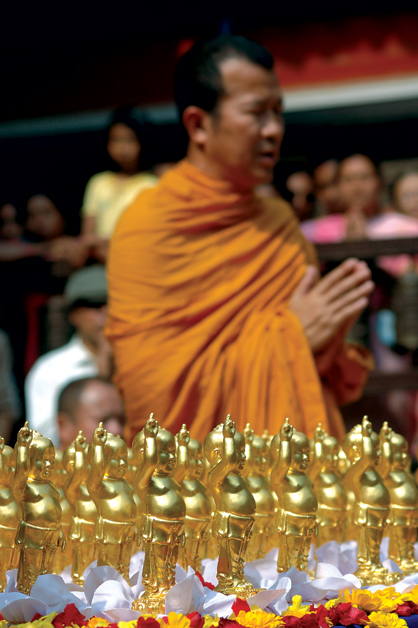 It is a Friday afternoon in late November. I spot a florist working amidst small saplings. I ask him over an iron railing how to get to his side. He directs me to take the passageway skirting his nursery. On the passageway people are pouring forth from the opposite direction, eager to make it to their praying place in the mosque. As I find my way into the nursery, the speakers placed in high places on the mosque come to life in a flurry of Arabic prayers. All around the nursery people have begun their noon-time prayers, descending gracefully, to kneel and to rise in reverence.
It is a Friday afternoon in late November. I spot a florist working amidst small saplings. I ask him over an iron railing how to get to his side. He directs me to take the passageway skirting his nursery. On the passageway people are pouring forth from the opposite direction, eager to make it to their praying place in the mosque. As I find my way into the nursery, the speakers placed in high places on the mosque come to life in a flurry of Arabic prayers. All around the nursery people have begun their noon-time prayers, descending gracefully, to kneel and to rise in reverence.
I watch the florist work, clipping dead and unwanted shoots, adding fresh soil into the plastic
covering encasing the roots, entwining the fragile stem to sturdy supports. On the balconies of the building facing the nursery, on the open space below, on the raised courtyard adjacent to us, people are praying, bowing to the majesty of the Maker, the one who made them, the florist, the gatekeeper to the mosque, and me.
I ask him whether the nursery belongs to the mosque. The man tending to the flowers says it does not. The florist inherited the nursery from his father, and it has been the family business for almost fifty years. He runs the nursery, though the mosque owns the property on which his nursery is located. I inquire about the rent of the land. The rent is surprisingly low; a place as big as this, and situated in an area that is expensive, would cost more. Besides the rent, the nursery provides, on request, the floral needs of the mosque, twice a year. A Hindu grows flowers on the land owned by an Islamic institution, and the flowers must be more fragrant.
I had come to the mosque seeking to talk to people about the concept of secular Nepal. Once I had met the florist and heard his story, I returned, knowing I had got what I had come for.
Talking about a secular state invariably leads to talk of religion, of beliefs, of doctrines and other points along which people are divided more than they are united. There are numerous connotations of the term ‘secular’ but, I shall not strive for the correct definition or meaning of a word; but will try to present what that word means in the human and national context. Understood simply, secularism must serve as a contrivance for unity and harmony.
In trying to get people, and specially those who have closely followed religion all their lives, to talk about secularism in Nepal, I soon learned that talking and words were not something that could describe, let alone establish secularism in Nepal. Talks about religion more or less tend to become mere utterances. The emphasis must be on action. People need to act for positive change to come about, and for it to remain.
A sister told me that one’s faith is determined by action; what you do or do not do is a direct result of your faith. When talking of the role of religion and faith in a secular state, this is the kind of faith that a secular state should foster, where one’s faith translates into action. And this action is not asking one to do something extraordinary, it is just asking one to do an extra bit of ordinary acts. Acts such as that of the family which went to India so that they could help rescue children trafficked into India from Nepal. Their faith motivated them to act, to act for the benefit of others. Where there are actions such as these, words are needless because meanings arise from what people do, not what they say. Such actions are all around us, they are everywhere in Nepal. So I do not think we as a nation need to be concerned with what kind of term will denote our nation, but with what each one of us can do to contribute to the nation’s progress.
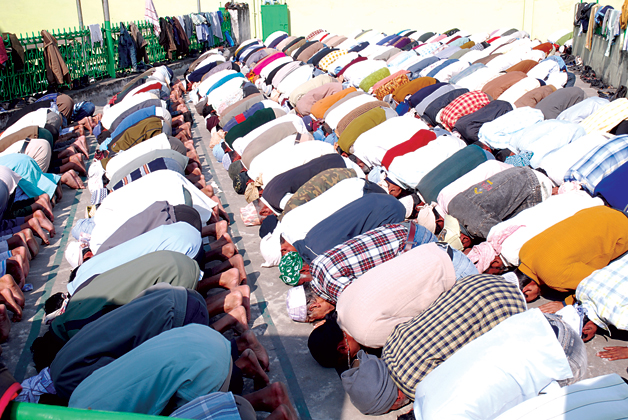
One would ask what will making Nepal a secular state result in. The answer is it would make no difference. Words and documents by themselves have seldom made differences anywhere. Declaring Nepal secular on a paper is the first step. The second and the more important step is to abide by this declaration, and that is for each one of us to do. And each one of us has to find within us the willingness to harmonize, to act to unite, to embrace disparities and search for similarities. Accepting and embracing diversity is at the core of lasting harmony and equality. A pastor who has been in Nepal for almost three decades told me that his most pleasant experience during his time here was when at the end of a long day of preaching his faith, people of a different religion would give him shelter in their homes. It is instances such as these that need to happen more often, and consciously, too. Nepal cannot be secular merely because a document declares it so; true secularism can only come about if our hearts and minds are secular.
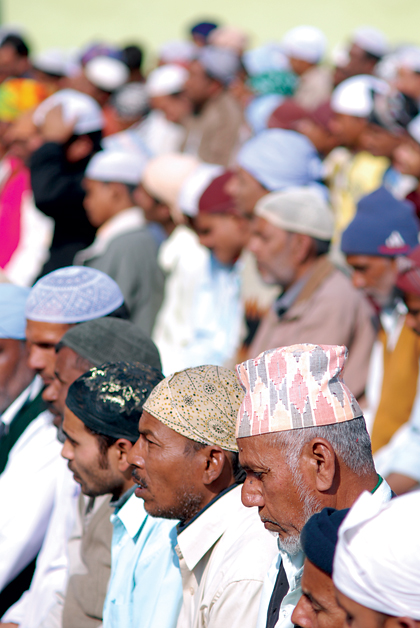 As many Nepalese do, I am wary of words, too – words like democracy, development, liberation, human rights and other promising terms. By now the average Nepali has lived a lifetime of listening to words that are at once promising, appealing, fresh, new, but which ultimately disintegrated into letters and remained confined to paper. The word ‘secular’ is perhaps the newest member of that long list of words that have so consistently disappointed. And, if each one of us does not realize his/her role in making Nepal secular, it will just be another hollow word. It has to be known that every Nepali not only has the right to enjoy the fruits of our nation’s progress, in whatever field or area, he/she even more importantly has the responsibility to protect that fruit-bearing tree. So if Nepal is to become a country where all religions are equal, people must begin first by accepting the basic principle that all people are equal.
As many Nepalese do, I am wary of words, too – words like democracy, development, liberation, human rights and other promising terms. By now the average Nepali has lived a lifetime of listening to words that are at once promising, appealing, fresh, new, but which ultimately disintegrated into letters and remained confined to paper. The word ‘secular’ is perhaps the newest member of that long list of words that have so consistently disappointed. And, if each one of us does not realize his/her role in making Nepal secular, it will just be another hollow word. It has to be known that every Nepali not only has the right to enjoy the fruits of our nation’s progress, in whatever field or area, he/she even more importantly has the responsibility to protect that fruit-bearing tree. So if Nepal is to become a country where all religions are equal, people must begin first by accepting the basic principle that all people are equal.
In some places and in some people’s understanding, equality means differentiating. That kind of equality is the line-drawing kind, where there are groups on either side who are tolerant towards one another. In such situations, there always are groups that need to be hauled into an equal position. If this type of thinking is to be adopted by us, I am skeptical about a secular state. Creating such a situation will necessitate the intervention of the state to level things. These interventions may vary from grant-giving to allocating seats in the government on the basis of religion. To sum up my concerns, secularism should not be allowed to become a political tool. Why create a situation in which division is necessitated because it is more profitable than unity?
The first step in practicing secularism as a nation is getting rid of the practice of tagging individuals on the basis of their religion. As citizens of a secular nation our concern should not be on the individual, and not on what religion he practices. This should not be confused with rejecting an individual’s religious beliefs and sentiments, but must be understood as identifying with an individual and acknowledging him first as a person with his/her own beliefs. One must avoid putting religion before an individual. This idea becomes clearer in the light of what a pastor told me when asked to give his views on Nepal as a secular state. He said, “I am a Nepali Christian.” He explained that his faith did not affect his nationality. And, that is how it should be.
Declaring Nepal a secular state is, in essence, a message. It is a message to the people about the stance of Nepal as a country on religion. In Nepal secularism has been in practice for a long time, even when it was known as a Hindu nation. So in addition to being a message, the declaration of the Nepal as a secular state is a reminder. And a timely reminder at that, since it comes at a time when division seems to be the order of the day, with every possible point of separation is being dug up. So, the idea of a secular nation is a reminder to all those who are obsessed with differences that harmony can exist amidst differences. It is a message that we Nepalis, irrespective of our religious beliefs, must feel one, and must feel for one another. If one Nepali is discriminated against on grounds of his religion, each one of us must feel wronged. Besides being a message, it is an unspoken commitment, whereby every one of us bears the responsibility for safeguarding and acknowledging one another’s religious sentiments. Like a Imam told me, “Nepalis in Kathmandu cannot rejoice over secularism when a mosque in some other part of Nepal burns.” A Hindu man guards the mosque where I met the Imam.
Some people I talked to were apprehensive of the Nepali translation of the word ‘secular’ itself: dharmaripekshya (literally, ‘religion-free’ meaning ‘religion-neutral’). They were concerned that the Nepali word in the declaration means something along the lines of atheism. They fear that at a time when religion is losing its grip on an individual, using such as term would further lead the individuals astray. They believed that a more appropriate translation is needed.
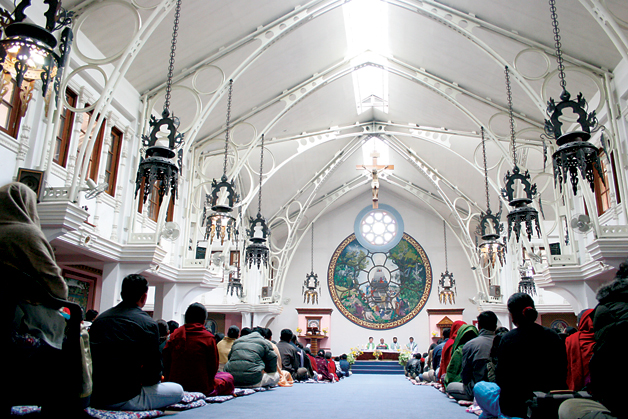
Even with a more accurate definition or translation of the word ‘secular’, the message it intends to deliver may fall short. In response to the fears of people about the inclination of the youth of today towards atheism, I would say that if the youth are moving away from religion, it is not because they are atheists, but because they have not seen real practitioners of religion. It is because religion is being put forth in a deluge of words, devoid of meaning. The message of religion is lost somewhere in the words of the religious. Maybe religion today has become a propaganda, stripped of its core message of love, brotherhood, sincerity, honesty.
Understanding the core values of a religion, not memorizing holy scriptures are the need of the day. The need is for us to do, not just to speak.
The majority of the people in Nepal would agree with the claim that Nepal has always been secular. Religions have thrived here for centuries without any gruesome episodes of religious clashes. This is undoubtedly a great achievement. I say achievement because harmony cannot be brought about by just passively allowing things to happen by themselves. The harmonious relations between the different religious groups in Nepal must have been possible due to the conscious effort of everyone. Though Nepal retains much of that glorious heritage of inter-religious well-being, it has also changed. There have been instances of religious tensions and violent exchanges between the so-called “religious groups” (I do not believe anyone who is religious can act violently). And chances are that religion, as in many places elsewhere in the world, will become a platform for political maneuvers. We must not forget the times when our country has been religiously divided, no matter what the magnitude or intensity of it was. Times when the secularity of a state is violated are reminders to assess where the seam of unity is coming undone. It is small instances, if ever religious frictions are small, which escalate into national tragedies. The secular Nepal we all have is an inheritance from our forefathers. It is up to us to preserve it.
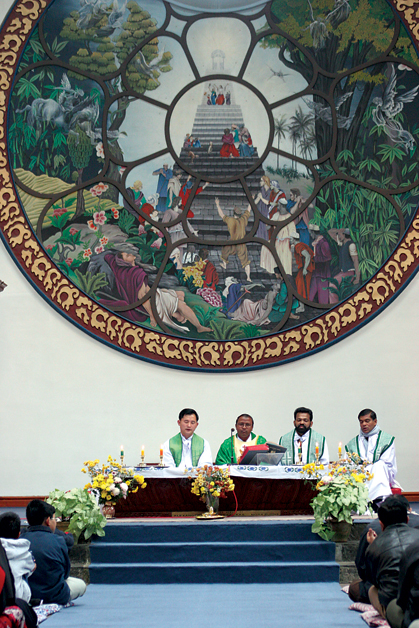 The picture of a secular Nepal is difficult to draw, but on one of my visits to a Catholic church I saw glimpses of it. Inside the church, on the walls all around were paintings depicting the various events from the Bible. The illustrations were the same as one may find in other churches except for one striking difference. All the characters shown in the paintings, their attire, the locations, the architectural styles were all Nepali. One painting had Jesus in traditional Nepali attire, learning the trade of a carpenter from his father. In the background their simple mud house. The priest who was showing me and my friend around took us to his favorite painting, the Last Supper. In that particular painting Jesus and his disciples are dining, seated on the floor of a hut. In another painting where Jesus is praying just before his capture, an angel is looking upon him, which is like a Buddhist Goddess. A wooden pedestal with a temple similar to Pashupatinath was placed near the main altar.
The picture of a secular Nepal is difficult to draw, but on one of my visits to a Catholic church I saw glimpses of it. Inside the church, on the walls all around were paintings depicting the various events from the Bible. The illustrations were the same as one may find in other churches except for one striking difference. All the characters shown in the paintings, their attire, the locations, the architectural styles were all Nepali. One painting had Jesus in traditional Nepali attire, learning the trade of a carpenter from his father. In the background their simple mud house. The priest who was showing me and my friend around took us to his favorite painting, the Last Supper. In that particular painting Jesus and his disciples are dining, seated on the floor of a hut. In another painting where Jesus is praying just before his capture, an angel is looking upon him, which is like a Buddhist Goddess. A wooden pedestal with a temple similar to Pashupatinath was placed near the main altar.
The paintings in the church, I felt, were more than just works of imagination; they are educative works. The artist presented Jesus as being amongst us, among Nepalis. But I also think that his presentation of Jesus in Nepali attire can also be understood as a sign that he was like us. So, if we can accept the idea of him being like any Nepali, we can be like him, someone who loved everyone.
Outside in the church courtyard a small area is set aside with walls that have square-shaped blocks of marble, behind which the ashes of people are placed after cremation. I am bit surprised because Catholics are traditionally buried after their death. The priest told me that the church had come up with this idea to compensate for the lack of a cemetery.
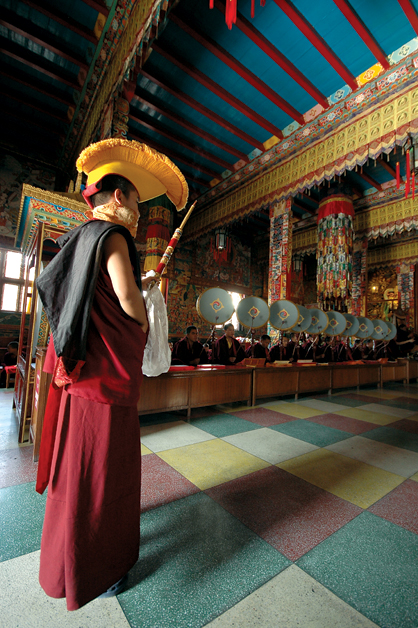 The experience of visiting the church was valuable at a time when I was on the lookout for examples of religious harmony. The church had taken religious harmony to a new level with their paintings. I felt, however, that although the idea of cremating and storing the ashes of the deceased was a noble innovation, it is also a compromise. And, compromises should not have to be made where everyone is equal.
The experience of visiting the church was valuable at a time when I was on the lookout for examples of religious harmony. The church had taken religious harmony to a new level with their paintings. I felt, however, that although the idea of cremating and storing the ashes of the deceased was a noble innovation, it is also a compromise. And, compromises should not have to be made where everyone is equal.
As a secular nation, Nepal will surely have its share of problems. People cannot be expected to share the same feelings and views. And in such circumstances, conflict is always possible. Unprecedented events often entail unprecedented problems. And, Nepal will have a number of these unprecedented problems too. One such problem that Dr K.B. Rokaya, a member of the Inter-Religious Council of Nepal, envisages will arise if the state engages in matters of religion. It is his viewpoint that religion must be excluded from the political arena. All matters concerning religion he believes, must be left to the people.
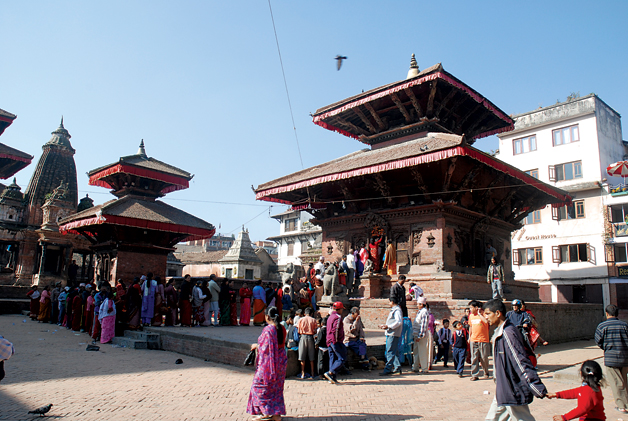
Dr Rokaya sees the biggest threat to religious harmony as coming from secularism itself. He believes guaranteeing freedom to choose and practice any religion of one’s liking is what the government should be concerned with. He is not in favor of the state supporting a particular religion, which if it does, only sets the precedence for other religions to receive favorable treatment by the state. This is the dilemma Dr Rokaya predicts that will arise if the state assumes the responsibility for religious affairs. This, he believes will sow the seeds of religious discontent and division. The Inter-Religion Council of Nepal recently opposed the idea of setting up a body of Muslim representatives out of their concerns that it would jeopardize national unity. In his view, religious freedom will lead automatically to equality, which is the function of a secular state.
I asked a monk what his expectations would be after the government declares Nepal a secular state, and he said, “I should be allowed to fold my hands in prayer.” When I tried to get him to talk further, he declined and said that he knew nothing about such things as secular state. This is the scenario in Nepal, although I did not talk to as many people as one should in order to arrive at conclusions. It matters less if the common Nepali man does not understand the term secular. But it does matter immensely that he/she understand what to do in secular Nepal.
The monk’s answer was probably the best I got while asking people about their views on the Nepal as a secular state. Though simply stated, his reply reveals the dichotomy of a secular nation – the need, and the working towards fulfilling that need. The need, as expressed by the monk, is to be given the freedom to practice one’s religion. The working part is the part each one of us has to play in creating an environment where our fellow countrymen can fulfill their need for religious freedom.
It is not just the history books that will have to be changed, not just the list of holidays in the calendar, not just the laws, but most importantly, the minds and hearts of people. Real change always begins in the mind and heart, and that is the only way changes ever come about. Each one of us has to become more tolerant towards the other, more understanding. The key is mutuality: mutual respect, mutual understanding and mutual outlook. People in secular Nepal not only need to delve into holy books, but to search within themselves the ability to relate to others.
I was on the balcony of a monastery in Boudhanath, forming questions in my mind that I would ask someone if they agreed to talk. Getting people to talk about religion is difficult and, once you do get them to talk, it is even harder to get them to stop. In front of me was the entrance to the prayer hall. People were coming and going when I noticed a boy on whose T-shirt were the out-of-place words, “worship Satan”. The juxtaposition struck me, though I was not too surprised by it. I am sure that that boy’s T-shirt is no testimony to his devotion to evil forces. But, what I saw made me feel that secular Nepal should be a lot like the scene where that boy wearing what we may call a not-very-religious T-shirt was clicking photos of Buddhist paintings. That scene demonstrates that no matter what your outer appearance or belief, it is the inner self that needs to secular.
Whenever I asked people, whether officials of a temple, mosque, church or monastery or the people visiting these places of worship, to share their views on secularism, the answers were almost the same. The answers came in the form of “should bes”. I would like to re-iterate that it is vital that we realize that a secular state only lays down certain provisions, which are required to be adhered to by law. But, it always remains in the hands of the people to practice the provisions of a state. It was difficult getting people to talk about secularism, and conversations often strayed towards their religion. There is no doubt that when it is hard to get people to talk about something, it is more onerous for them to work on it. There will always be people who want more and other who want to give little. The need is for people to become more generous, not just materialistically but in their judgment of others.
I visited mosques, temples, churches, monasteries and talked to people who came to these places. I hoped that perhaps I would discover ideas about secular Nepal. But the most meaningful insights did not come when people talked. It came when they were not talking, when the ordinary people were doing whatever they have been doing day-in and day-out. One such instance stands out from the rest. I was sitting on the steps behind facing the open space in the Syambhunath premises, watching the sun sink between the blue hills. I had been sitting there for a while and I rose and walked away with hopes of finding a monk to talk to. I did not find a monk but when I returned I saw in the fading light a man with a white cap on, kneeling on a bench, facing westwards and praying. And that is what I picture secular Nepal to be like – where everyone feels free and where everyone rejoices at the freedom another man has.
The setting sun had left behind enough light to illumine Nepal at its best, and perhaps the scene will help bring out the best in all of us. So every time the prayer wheels turn, every time the bell peals, every time the muezzin calls, if you close your eyes and listen intently, no matter who or where you are, you will hear the same thing – we are one.










